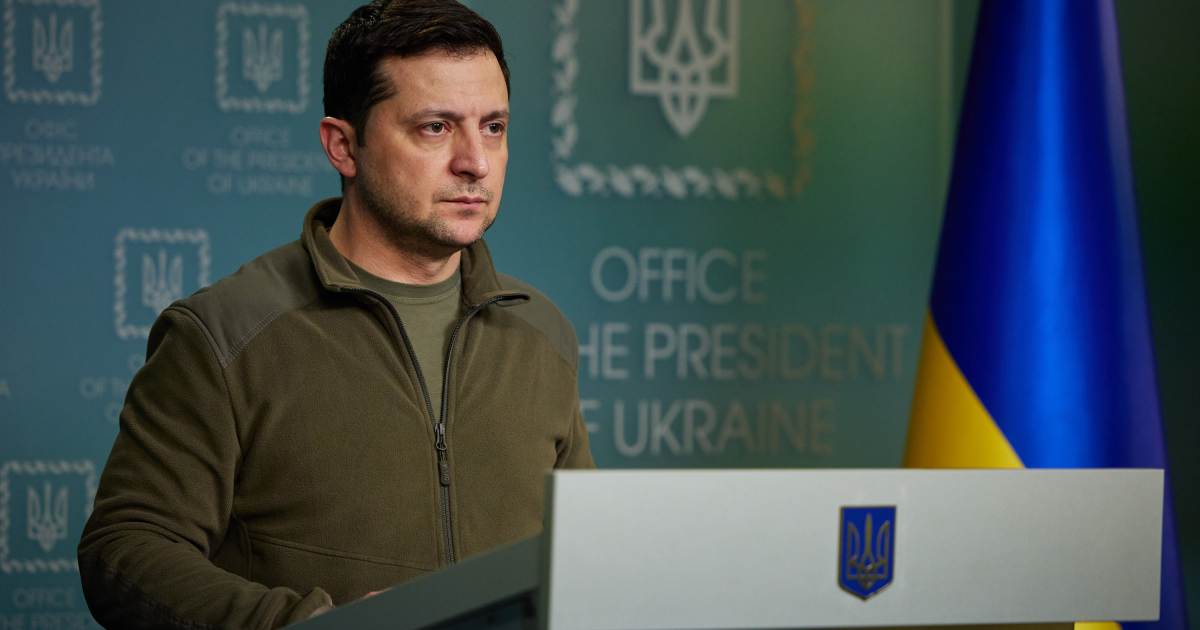Ukrainian President Volodymyr Zelensky said that the chances of holding a second round of talks between his country's delegation and the Russian delegation are slim, stressing the importance of an immediate ceasefire so that dialogue can continue.
Zelensky stressed that with dialogue and the continuation of negotiations, but provided that the bombing of civilians stops, he said, "It is not possible to sit down to negotiate while the planes are flying and the bombing continues. The least that should happen is to stop the bombing and then sit at the table for talks."
Sputnik news agency quoted a Belarusian source as saying that the second round of Russian-Ukrainian negotiations will be held today, Wednesday, in a border area between Belarus and Poland.
The first round of negotiations was held on February 28 on the border between Ukraine and Belarus, and the two sides agreed to continue negotiations within two days.
Belarusian President Alexander Lukashenko accused the West of trying to undermine the negotiations by supplying arms to Ukraine.
On the other hand, he stressed that his country's forces "have not and will not participate in the Russian special military operation on Ukrainian territory."
But Lukashenko returned and assured that the Belarusian air defense systems would remain on alert to prevent striking Russian forces from the rear.
Summit between Putin and Zelensky
The Belarusian president said that the possibility of holding a meeting between Russian President Vladimir Putin and his Ukrainian counterpart "is not excluded, but conditions must be created for that."
But Russian presidential spokesman Dmitry Peskov responded by saying that "it is too early to draw conclusions about the possibility of holding a meeting between the presidents of Russia and Ukraine."
And Sputnik news agency quoted the Ukrainian president as saying that he was “ready to hold negotiations with the Russian president,” adding that “in order to take steps forward you need someone who takes steps forward, and where there are big problems and the risk of losing lives every day, you have to step back.” ".
Security guarantees
Regarding Ukraine's accession to the North Atlantic Treaty Organization (NATO), Zelensky said if this matter was under discussion, his country would obtain security guarantees after "the Russian aggression is inevitable."
"If our partners are not ready for Ukraine to enter NATO because Russia does not want it, they must establish security guarantees for Ukraine, and this means that we have our territorial integrity, that our borders are protected, that we have special relations with all our neighbors, that we are absolutely safe," he added.
Zelensky said - in a joint interview with Reuters and CNN - that his country still hopes that European countries will respond to the request to impose a no-fly zone over Ukrainian airspace, stressing that this matter helps his country a lot, "The issue of the no-fly zone could have helped us a lot. It's not about dragging NATO countries into war; everyone was dragged into the war a long time ago, not by Ukraine, but by Russia."
"I've spoken to President (US) Biden several times, and I'm very grateful to him for all the opportunities and support, but they didn't hear me, we were left alone against Russia, and we simply can't," he added.
nuclear weapon
Russian Foreign Minister Sergei Lavrov accused Ukraine of playing what he described as dangerous games to regain its nuclear weapons.
Lavrov said - in a speech delivered via video technology at the Geneva Armaments Conference - that Western countries should abandon the establishment of military facilities in the former Soviet lands.
He expressed his country's readiness to coordinate with Washington on strategic stability, stressing that Moscow recognizes Zelensky's legitimacy as Ukraine's president.
It was remarkable the withdrawal of Western diplomats from the United Nations hall in Geneva with Lavrov beginning his speech, as the hall seemed almost empty.
It is expected that the United Nations General Assembly will vote tomorrow on a draft resolution on the ongoing Russian war in Ukraine, during an emergency meeting of the Assembly that began yesterday.
UN diplomats said the draft resolution had been watered down from "condemnation of the attacks" in Ukraine to "regret of the attacks".
Resolutions of the General Assembly (non-binding) are issued with the approval of at least two-thirds of the members.
Russia isolate
Meanwhile, international diplomatic calls to isolate Russia accelerated, and US Secretary of State Anthony Blinken suggested expulsion of Moscow from the membership of the Human Rights Council;
In response to the Russian war on Ukraine.
In a video speech to the Geneva-based Human Rights Council, Blinken said, "We can rationally ask whether a UN member state should be allowed to try to take over another member state, commit horrific human rights violations, and cause massive human suffering; To stay on this board?"
Britain has said it is open to Moscow's expulsion from the UN Security Council.
It is one of its permanent members along with America, China, France and Britain.
A spokesman for the British Prime Minister said in press statements that Boris Johnson "has not taken a position yet, but we can say that we are further isolating Russia diplomatically, and we will study all options that lead to that."
The European Parliament approved a resolution demanding that the institutions of the European Union give Ukraine the status of a candidate state for membership, and reduce the number of Russian diplomatic missions in the countries of the Union.
The European Parliament also approved a draft resolution calling for the expansion of sanctions imposed on Russia, "to weaken the Russian economy and reduce Moscow's threat to peace in the future."

